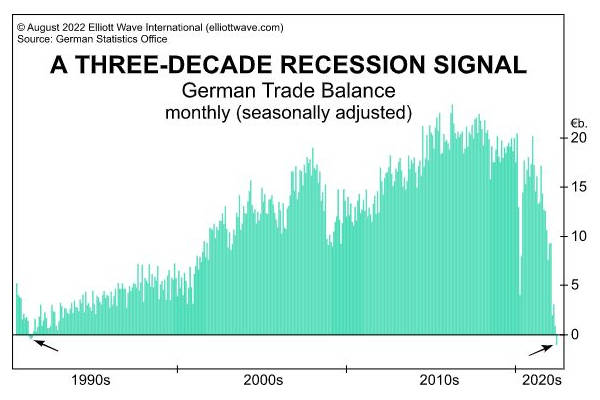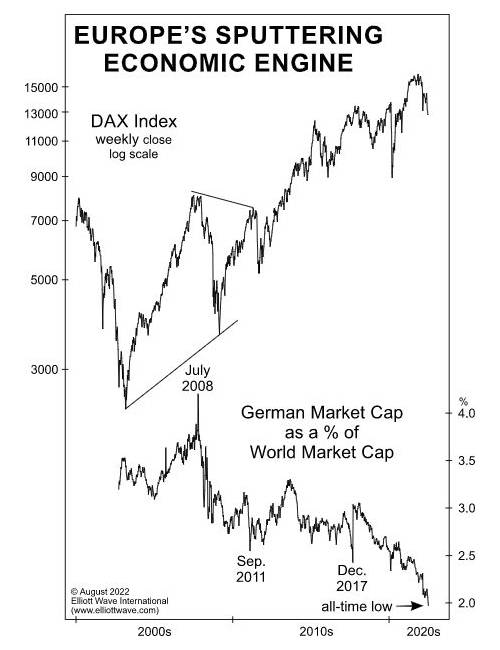Many people are concerned about the return of a recession now that the FED has been actively tightening and the market has begun falling. Other indicators are flashing signs that we are already in a recession i.e. two consecutive quarters of falling GDP. But so far the National Bureau of Economic Research (NBER) hasn’t officially declared a recession to be in progress. Although, it generally takes them a while after the fact to make the official determination of the beginning (or end) of a recession. In addition to falling GDP other factors can trigger a recession as we will see from the following article from Elliott Wave International. ~ Tim McMahon, editor
Will Another “Great Depression” Start in Europe?
By Elliott Wave International
Many people are familiar with the Great Depression of the early 1930s, but most of them may not know that this economic calamity began in Europe before arriving in the U.S., as a past issue of the Global Market Perspective has noted (the Global Market Perspective is a monthly Elliott Wave International publication which covers 50-plus worldwide financial markets).
In Germany, for instance, consider that real GDP fell 1% in 1929 after growing 8.2% in 1927 and 2.8% in 1928. Other economic indicators hit a peak as early as 1927.
Only time will tell if history repeats. Yet, here in 2022, we do know that troubling signs are developing in Europe’s biggest economy.
First, look at this recession indicator from the August Global Market Perspective with the commentary below:
Companies in Germany are seeing “softer demand for their products amid a darker economic outlook.” (Bloomberg, 7/4/22)
Germany’s GDP also stagnated in July. More importantly, the economy recorded a 0.5% drop in overseas sales while imports were up 2.7%, meaning that the country recorded its first trade deficit since 1991. While deficits themselves are not recessionary, the change in behavior is notable, and, in case you’re wondering, 1991 was indeed a recession year.
Since this analysis was published, an August 22 Reuters headline said:
“German recession increasingly likely”, Bundesbank says
Some of Germany’s neighbors are likely already experiencing economic contractions — like Estonia and Latvia. Other economies — Austria, Belgium, Luxembourg, and Portugal — registered shrinking GDPs in Q2.
Getting back to Germany, here’s more commentary and another chart from the August Global Market Perspective:
The bottom graph on this chart shows the market capitalization of German companies as a percentage of the worldwide market cap. Notice that it has been declining since its high point in 2008. … The percentage has dipped relentlessly lower, falling to an all-time low of 1.92% just two weeks ago. Today, among Germany’s largest four companies, only one ranks among the world’s 100 largest.
Free Report ($30 value): See 3 more charts that open your eyes to what’s next
The insights above are also featured in a new special report that you can access right now (free, easily a $30 value).
The report gives you 4 short, powerful excerpts from one of our most popular services — Global Market Perspective. Usually reserved for subscribers, we think you will also appreciate the insights. It’s our quick take on markets in the U.S., Europe and Asia, plus a look at the U.S. dollar.
FREE: Get “4 Market Charts You Won’t See Anywhere Else” now >>
This article was syndicated by Elliott Wave International and was originally published under the headline Will Another “Great Depression” Start in Europe?. EWI is the world’s largest market forecasting firm. Its staff of full-time analysts led by Chartered Market Technician Robert Prechter provides 24-hour-a-day market analysis to institutional and private investors around the world.


Speak Your Mind